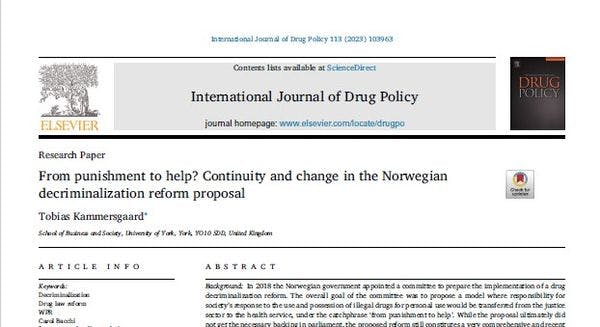¿Del castigo a la ayuda? Continuidad y cambio en la propuesta noruega de reforma de la descriminalización
Kammersgaard subraya cómo las racionalidades y prácticas existentes asociadas a la prohibición a menudo se mantienen intactas en las propuestas de descriminalización, a pesar del impulso hacia enfoques de salud y derechos humanos. Más información, en inglés, está disponible abajo.
In 2018 the Norwegian government appointed a committee to prepare the implementation of a drug decriminalization reform. The overall goal of the committee was to propose a model where responsibility for society’s response to the use and possession of illegal drugs for personal use would be transferred from the justice sector to the health service, under the catchphrase ‘from punishment to help’. While the proposal ultimately did not get the necessary backing in parliament, the proposed reform still constitutes a very comprehensive and recent proposal for reforming national drug policy and it provides an ideal case for studying contemporary discourses on ‘drug decriminalization’.
The analysis of this reform proposal is guided by the post-structuralist “What’s the Problem Represented to be” (WPR) approach, which is used for investigating the problem representation(s) in the proposal, as well as the rationalities, practices and deep-seated assumptions underpinning these. In doing this, the paper explores how the strategy represents both changes and continuities in discourses around illicit drugs and the people who use them.
Based on the WPR approach, two problem representations in the proposal are identified: the ‘problem of illicit drug use’ and the ‘problem of criminalization’. However, the ‘problem of illicit drug use’ is argued to be the authoritative representation, that takes precedence over the other. In that regard, the paper points to how the proposed shift from the justice sector to the health sector would only be partial, given that the role of the police and drug law enforcement would be retained in the reform. Furthermore, the paper points to how illicit drug use continued to be fundamentally pathologized in the proposed reform.
The paper concludes with a discussion about the overall ambition of shifting from a crime-centered to a health-centered approach to people who use drugs and some reflections on the potential of an additional rights-based approach is provided.
